

Ready To Play? Let the Kids Learn Through Play. Photo TWENTY years ago, kids in preschool, kindergarten and even first and second grade spent much of their time playing: building with blocks, drawing or creating imaginary worlds, in their own heads or with classmates.
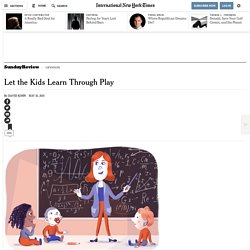
But increasingly, these activities are being abandoned for the teacher-led, didactic instruction typically used in higher grades. In many schools, formal education now starts at age 4 or 5. Without this early start, the thinking goes, kids risk falling behind in crucial subjects such as reading and math, and may never catch up. The idea seems obvious: Starting sooner means learning more; the early bird catches the worm. But a growing group of scientists, education researchers and educators say there is little evidence that this approach improves long-term achievement; in fact, it may have the opposite effect, potentially slowing emotional and cognitive development, causing unnecessary stress and perhaps even souring kids’ desire to learn. Continue reading the main story.
05_10_eyc_vol16_no1_bmacgregor.pdf. ELF_Newsletter_No2_June2012.pdf. Learning through play ey. Children are suffering a severe deficit of play – Peter Gray. When I was a child in the 1950s, my friends and I had two educations.
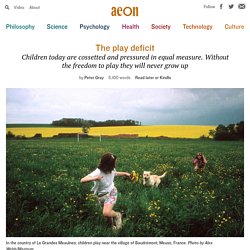
We had school (which was not the big deal it is today), and we also had what I call a hunter-gather education. We played in mixed-age neighbourhood groups almost every day after school, often until dark. We played all weekend and all summer long. We had time to explore in all sorts of ways, and also time to become bored and figure out how to overcome boredom, time to get into trouble and find our way out of it, time to daydream, time to immerse ourselves in hobbies, and time to read comics and whatever else we wanted to read rather than the books assigned to us. What I learnt in my hunter-gatherer education has been far more valuable to my adult life than what I learnt in school, and I think others in my age group would say the same if they took time to think about it.
Over the same decades that children’s play has been declining, childhood mental disorders have been increasing. Www.nicurriculum.org.uk/docs/foundation_stage/learning_through_play_ey.pdf. Www.ecta.org.au/_dbase_upl/05_10_EYC_Vol16_No1_BMacGregor.pdf. NQS_PLP_E-Newsletter_No66.pdf. EYC_LOUIS_BRADFIELD_ARTICLE.pdf. 05_10_EYC_Vol16_No1_BMacGregor.pdf. Is not available. LLIS-56_Games-Do-Count.pdf. Should we just let them play? Anyone who’s ever watched a toddler play with water and different-sized containers has seen play-based learning in action.
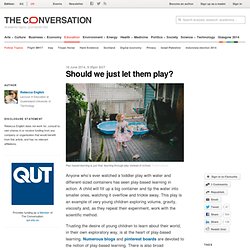
A child will fill up a big container and tip the water into smaller ones, watching it overflow and trickle away. This play is an example of very young children exploring volume, gravity, viscosity and, as they repeat their experiment, work with the scientific method. Www.importanceofplay.eu/IMG/pdf/dr_david_whitebread_-_the_importance_of_play.pdf. Health.act.gov.au/c/health?a=dlglobres&globres=1264819712.
Abcdoes.typepad.com/files/challenging-practice-to-further-improve-learning-playing-and-interacting1.pdf. Abcdoes.typepad.com/files/learning-playing-and-interacting.-final1.pdf. Abcdoes.typepad.com/files/lighting-the-fire-community-play-things.pdf. Why play-based learning? ' ... for the EYLF to be implemented properly, all early childhood educators need to know what play is, why it is important, how to implement and assess a play-based program and their role in it.' Questioning practice The Early Years Learning Framework (EYLF) is built on the understanding that the principles of early childhood pedagogy (DEEWR, 2009, pp. 12-13) guide the practice of early childhood educators.
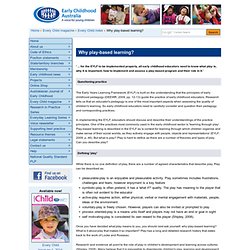
Research tells us that an educator's pedagogy is one of the most important aspects when assessing the quality of children's learning. So early childhood educators need to carefully consider and question their pedagogy and corresponding practices. In implementing the EYLF, educators should discuss and describe their understandings of the practice principles. Could this be the most play-literate PR video ever? A couple of weeks ago the UK laundry brand Persil (known in many parts of the world as Omo) released a set of short videos called ‘Kids Today’.
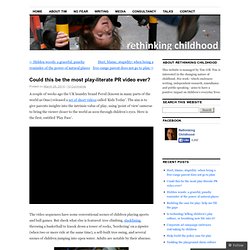
The aim is to give parents insights into the intrinsic value of play, using ‘point of view’ cameras to bring the viewer closer to the world as seen through children’s eyes. Here is the first, entitled ‘Play Face’. The video sequences have some conventional scenes of children playing sports and ball games. But check what else is featured: tree climbing, slacklining, throwing a basketball to knock down a tower of rocks, ‘bordering’ on a zipwire (when two or more ride at the same time), a self-built tree swing, and several scenes of children jumping into open water. Adults are notable by their absence. The captions make compelling reading too. Www.education.gov.sk.ca/Default.aspx?DN=c711842e-23aa-4e82-b33d-4a530f8d4b2f. Www.educationscotland.gov.uk/Images/17play_tcm4-637902.pdf. Play as pedagogy - Early Learning.
" Education is what the child does in order to discover........it is not about pouring information into an empty vessel.
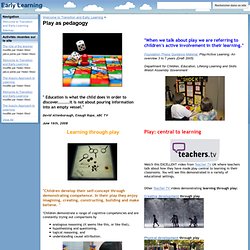
" David Attenborough, Enough Rope, ABC TV June 16th, 2008. Do You Give Yourself Permission to Play? Play is usually discussed as though it were a relief from serious learning.

But for children, play is serious learning. It’s a way to cope with life and to prepare for adulthood. Children speaking about the importance of play. Play around the world. Living, learning, playing, wondering and pondering at Playcentre. Filth Wizardry. Get your mess on! SAND AND WATER TABLES. Play: Where Learning Begins! Play Quotations. Organising and arranging experiences for children. Preschool Reportedly Bans Imaginary Superhero Play. The Mud Kitchen - A Recipe for marvellous Outdoor play. Hello lovely blog visitors.
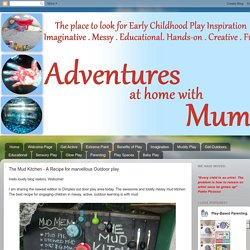
Welcome! I am sharing the newest edition to Dimples out door play area today. The awesome and totally messy mud kitchen. The best recipe for engaging children in messy, active, outdoor learning is with mud. Here is the DIY mud kitchen that we built for Dimples in a few hours using recycled materials. The mud kitchen is built from off cuts of wood that I painted with chalk board paint, they're butted in to a old sink that came from a wrecked caravan, you could grab one from the wreckers or the buy back at the tip. Nearby I have up cycled an old sand pit as a mud pit. Play based learning. Play as a context for early learning and development. The power of play-based learning - Child's Play Music. Ms. Conway's Kindergarten Website: About Play-Based Learning.
It has long been known that there is a strong link between play and learning.
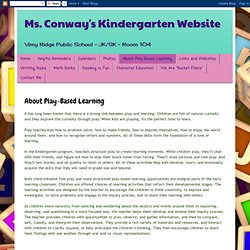
Children are full of natural curiosity and they explore this curiosity through play. When kids are playing, it's the perfect time to learn. Play teaches kids how to problem solve, how to make friends, how to express themselves, how to enjoy the world around them, and how to recognize letters and numbers. All of these skills form the foundation of a love of learning. Favorite play based learning blogs. The journals of a Laura Ingalls wannabe. Let the children play. Peace Of Mind Family Day Care. The Ten Commandements of Play-Based Learning « Abundant Life Children. My day-to-day work with young children paired with the here-and-there trainings and consultations I do with other early childhood professionals continue to teach me this: one of the most difficult lines to toe in the complex world of play-based learning is the one that separates “too involved” from “disengaged”.
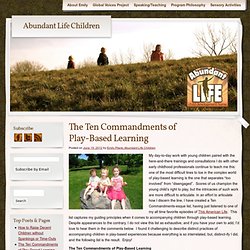
Scores of us champion the young child’s right to play, but the intricacies of such work are more difficult to articulate. In an effort to articulate how I discern the line, I have created a Ten Commandments-esque list, having just listened to one of my all time favorite episodes of This American Life. This list captures my guiding principles when it comes to accompanying children through play-based learning. Despite appearances to the contrary, I do not view this list as exhaustive, and if you have your own to add, I’d love to hear them in the comments below. Preschool lessons: New research shows that teaching kids more and more, at ever-younger ages, may backfire. Illustration by Alex Eben Meyer Ours is an age of pedagogy.
Anxious parents instruct their children more and more, at younger and younger ages, until they're reading books to babies in the womb. They pressure teachers to make kindergartens and nurseries more like schools. So does the law—the 2001 No Child Left Behind Act explicitly urged more direct instruction in federally funded preschools. There are skeptics, of course, including some parents, many preschool teachers, and even a few policy-makers. What do we already know about how teaching affects learning? Developmental scientists like me explore the basic science of learning by designing controlled experiments. In the first study, MIT professor Laura Schulz, her graduate student Elizabeth Bonawitz, and their colleagues looked at how 4-year-olds learned about a new toy with four tubes. All of the children pulled the first tube to make it squeak. Harvard Education Letter. New Haven teacher Elise Goodhue tries to fit play into the rigors of kindergarten Volume 26, Number 5September/October 2010 New data support a return to “balance” in kindergarten By Laura Pappano Kids Haven’t Changed; Kindergarten Has, continued.
Environmentalising early childhood education curriculum through pedagogies of play (Free full text available) Susan Edwards Amy Cutter-Mackenzie Monash University IN RECENT YEARS THE CONCEPT of child-centred play as an informant to the early childhood curriculum has been critiqued as an insufficient pedagogical approach for supporting children’s knowledge development. Running in parallel with these criticisms has been the emerging importance of environmental education in early childhood curriculum. A key aspect of early childhood environmental education involves children experiencing and acquiring various environmental concepts.
Play Based Learning Ideas. Talking about play. Play-based learning and intentional teaching in early childhood contexts. Play-based learning and intentional teaching in early childhood contexts Play-based learning and intentional teaching in early childhood contexts Louise Thomas Elizabeth Warren Eva deVries Australian Catholic University. Play Based Learning. Play based learning. Learning through play. ‘They get fed up with playing.’ Parents’ views on play-based learning in the Preparatory Year. The value of play. Let’s make sure we are not playing our way to collective ignorance! ” play-based learning” “enquiry learning” ” project learning” investigative learning” Why do I feel a sense of despair in the pit of my stomach when I hear these labels being tossed around like the lettuce in my mixed salad? Is it the implied simplicity that accompanies such statements as ‘Just follow the interest of the learner’, or is it the assumption that all our students come to the table with a strong language foundation that equips them to engage in the openness and by some form of osmosis develop the necessary skills and competencies to engage with the multitude of learning opportunities offered?
Don’t get me wrong, I believe in play as an essential part of the learning process. I believe in and in fact am a strong advocate of ‘personalization’ (Breakthrough, Fullan, Hill &Crevola, 2006). PDF play based learning statement. Irresistible Ideas for play based learning.